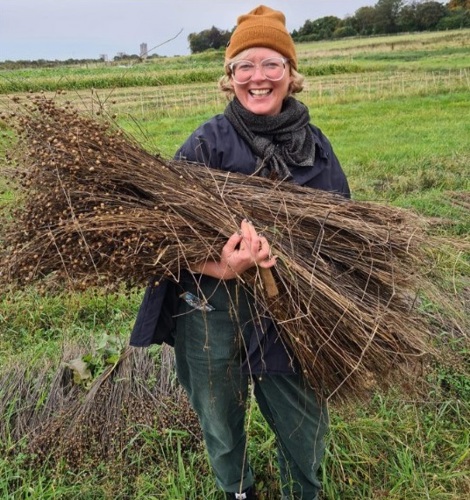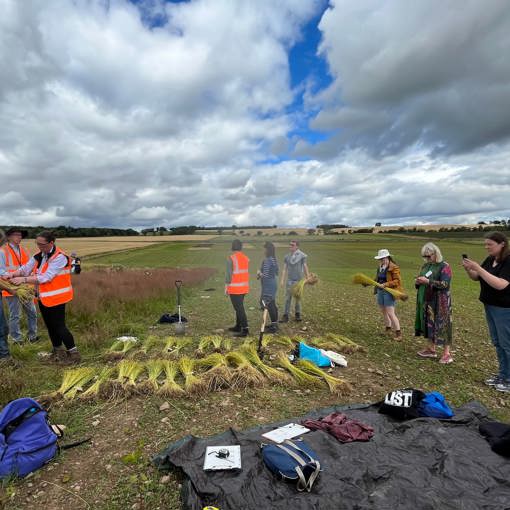Flax was once grown widely to support a thriving linen industry across Scotland but declined in popularity, with 80% now grown in Europe.
With demand for biodegradable fabrics rising, the farms near Dundee, Edinburgh and Oban grew three flax varieties – Avian, Delta and Tango – in the Growing Flax for Regenerative Textiles field lab with Innovative Farmers.
Exceptional yields and early cropping
As longer flax fibres can produce higher quality linen, the group focused on finding the best growing conditions – aiming for crops one metre in height and a total yield of six tonnes per hectare, the industry standard in Europe.
The trial found the average heights of Avian and Delta were 78cm and 79cm respectively, with Tango slightly lower at 64cm. However, the crop produced exceptional yields, with Avian reaching 13 t/ha at one site – Delta and Tango peaked at 12 and 10 t/ha. All crops were grown without artificial fertilisers.
The trial also found that the crop was ready to harvest at around 117-120 days after seeding in Scottish climates – the average for warmer areas in Europe is only slightly shorter at 100 days.
Lauriston Farm, a 100-acre organic horticulture and arable enterprise in Edinburgh, grew three 30m2 plots of each variety, without weeding after sowing.

Developing flax's commercial potential
Grower Jossie Ellis said: "We recorded encouraging results despite drought affecting the crop getting established. Under our conditions, the Avian variety performed well, growing to 74cm with a yield of eight tonnes per hectare.
"We’ve shown that flax is a suitable crop for a farm of our size – for future trials we still won’t spend time weeding but we’ll be experimenting with sowing at a higher density.
“This trial shows us a way forward for producing sustainable fabric – as a network of farmers we can develop flax’s commercial potential for larger-scale processing and for smaller-scale growers and craftspeople.
“This could provide us with an income through sales to fibre producers and by running courses for people to connect with the land through regenerative textiles.
“The most exciting part is the public’s reaction – they really engaged with making fibres and cloth in the workshops we ran – so we know there’s an audience who are willing to engage further.”
The crop will be processed into yarn, with samples lab-tested by colleagues at Fantasy Fibre Mill and Heriot-Watt University for fibre length, strength and quality. Results are expected in Autumn 2024.
Sustainable fabric
The results show the potential to produce a sustainable source of linen, which could revive Scotland’s linen industry.
The findings can be used to support supply chain and market feasibility studies and further the business case for industry investment in specialist harvest and processing equipment.
Additionally, demonstrating that flax can be grown without artificial fertilisers makes it a viable option for any farm looking to reduce inputs or diversify crop rotations.
Following the results, the farmers are planning to scale up this year and collaborate with a growing network of businesses and organisations to establish a commercially viable linen processing and supply chain.
The trial harvested the flax by hand, a potential barrier to larger-scale uptake which could be resolved by further investment. Discussions are already underway to explore setting up an equipment co-op to share the cost of importing machines from mainland Europe.
Engagement from the wider community
In addition to the farms, the trial engaged with 30 growers over 25 community sites, aiming to increase awareness and engagement with flax as a sustainable fibre crop.
Located on the grounds of the Glasgow Botanical Gardens, artist Elisabeth Viguie Culshaw runs a small business called #TheIndigoPlot, which works with sustainable fabrics and dyes. She plans to join the next round of the field lab to educate the public on flax’s potential as a nature-friendly source of linen.
Elisabeth said: “We want people to see every step of the flax being processed – how it’s grown, harvested, dried and transformed into fibre.
“More flax in Scotland means reconnecting with our heritage and exploring sustainable fashion alternatives – the movement away from fast fashion starts here.”
Growing a sustainable future for Scotland's textile industry
Soil Association Senior Farming Manager Colleen McCulloch said: “There’s a growing demand for traceable, sustainably produced UK natural fibres – we can now demonstrate that modern flax varieties grow well in Scotland, and that it works with nature-friendly, low-input systems.
“The growers have helped make this trial successful – we’re excited to see how this helps develop Scotland’s regenerative textiles industry.”
Plans are underway to refine the trial for 2024 and expand to four new farms, testing the same three varieties. The crop is planned for sowing in April.
Interested in finding out more? Follow this field lab for the latest activity, results, and reports.

